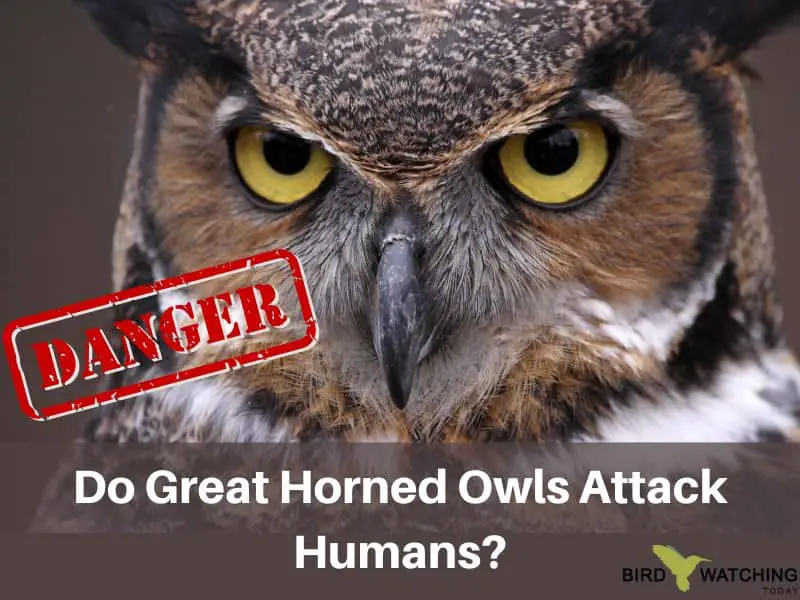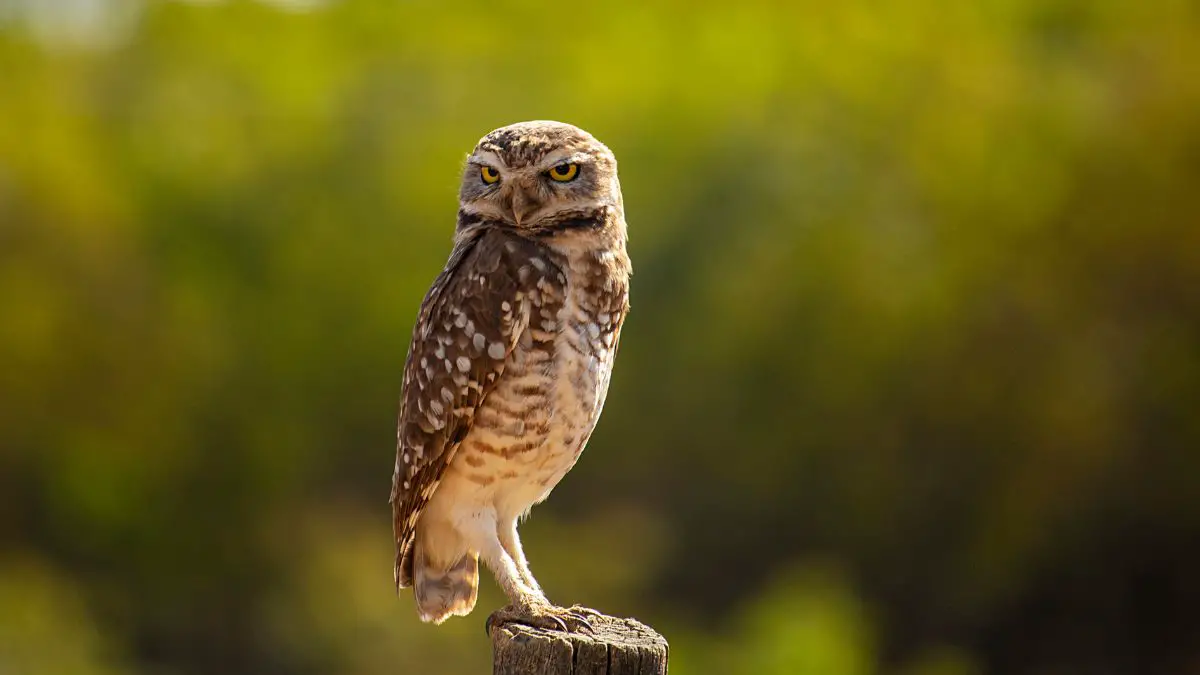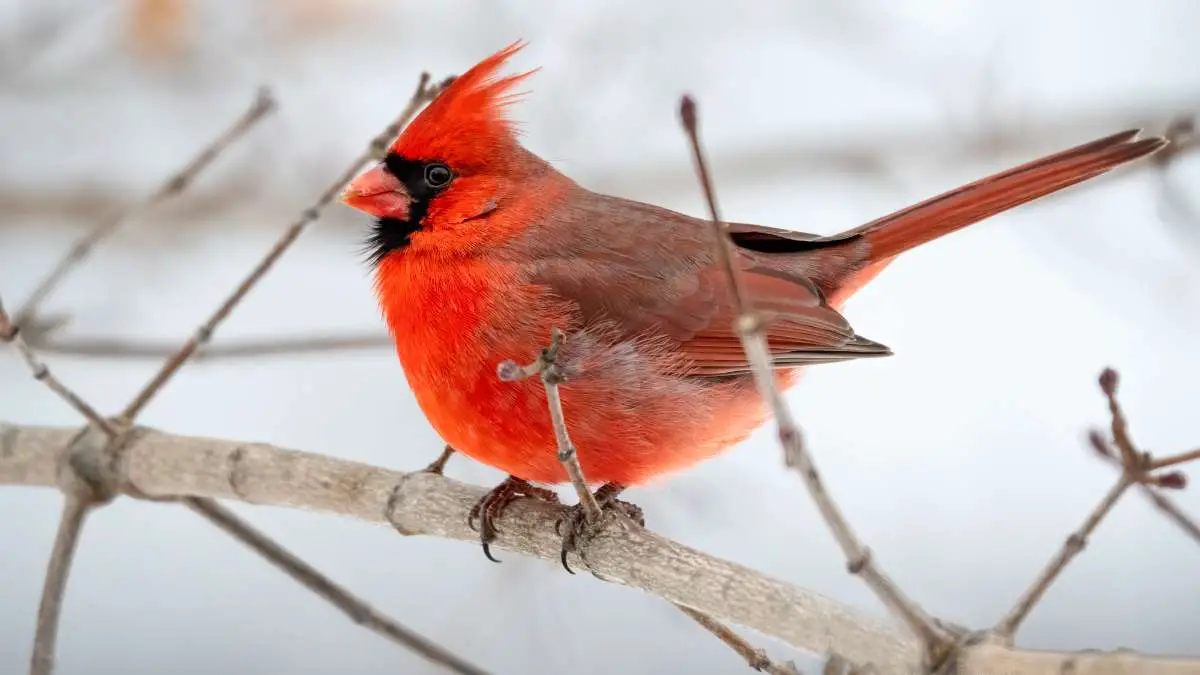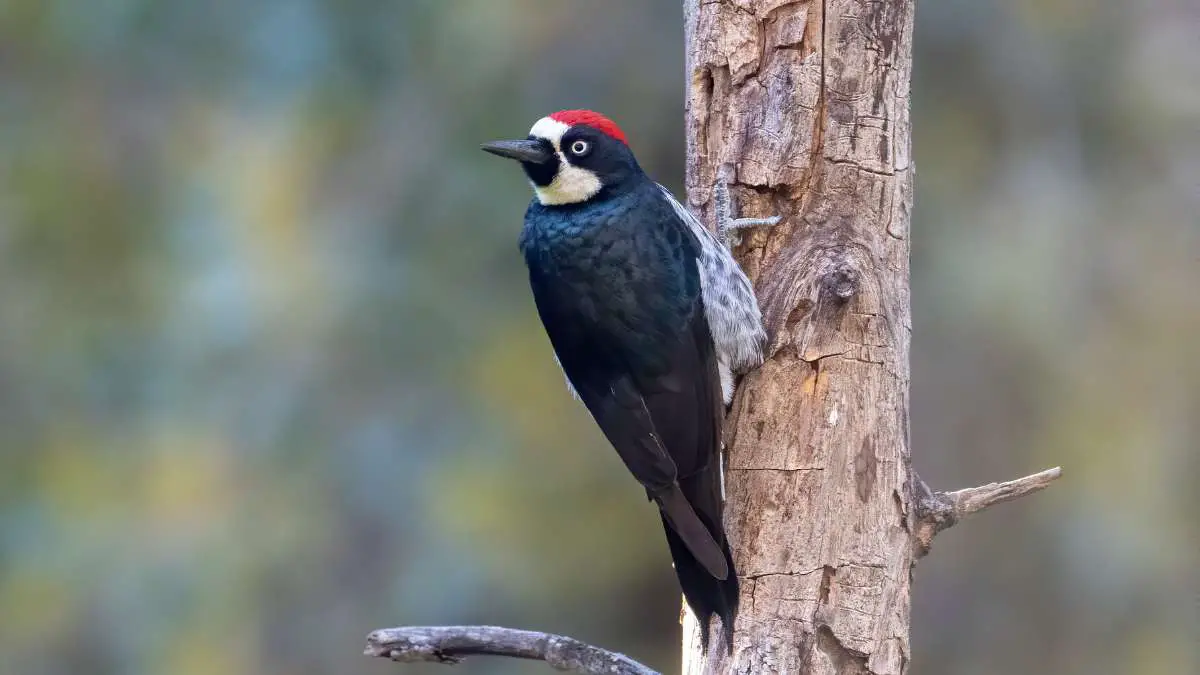Great horned owls are undoubtedly one of the most fearsome birds to see, especially at night. Their staring yellow eyes, long ear tufts, large size, and deep hoots are definitely frightening to many. But, are they really dangerous to humans? Here, you will find out how much you should be concerned about the presence of a great horned owl in your vicinity.
So, the first question you may have now is “do great horned owls attack humans”?
Yes. Great horned owls attack when there is a threat to their nests, young, or to their territories. So, if the threat is a human, no exception, they attack without hesitation.
But, since even seeing a great horned owl is not so common, reported attacks by them are very rare. Here’s a reported attack.
But, can a great horned owl kill a human (or make a severe injury)?
I have not heard or found any news or report on human deaths caused due to an attack by a great horned owl. (If you know any, please let me know). However, it is crucial to understand how dangerous their attacks would be.
Great horned owls attack and kill prey heavier and larger than them. In order to do that, they use their sharp strong talons and sharp hooked bills. Once they make the grip from talons, it requires about 25-30 pounds of force to open them. They are that much stronger. And, they use their bill to tear off meat from captured prey. So, an adult great horned owl can cause serious injury to a human.
And when great horned owls attack humans, most probably they will attack the head, neck, and shoulders since they land from above. Injury to the eyes, throat, or severe grip on the head by talons can be very severe and can cause a life threat. Hence, even though there are no reports of deaths of humans due to their attacks, we can not ignore the possibility of that happening.
Where and when great horned owl attacks might happen (to humans)?
Great horned owls are one of the most widespread owls in North America. They occur in almost all regions and states (Checkout their range map). And also they are quite adaptable birds and can be found in quite different habitats.
Their habitats include green deciduous forests, tropical rain forests, deserts, swamps, and tundra edges as well as urban setups such as parks, cemeteries, botanical gardens, suburbs, and cities. That’s why people hanging around such places have faced some incidents of owl attacks.
Next, at what time of the day, great owl attacks might happen?
Generally, we know that owls are nocturnal, which means they are active at night (but not all owls are nocturnal). Great horned owls are also silent night predators.
In the dark, great horned owls get optimal night vision. Their eyes are tuned to that. And, they have sharp asymmetric ears that can hear subtle sounds such as rustling noises in dead leaves when prey such as a mouse moves slowly in the darkness. Their right ear is positioned slightly above the left so that sound reaches one ear a fraction of a second later than the other. It helps them to pinpoint their prey with incredible accuracy.
In addition to that, they can fly silently. Their fringed wing feathers muffle the wing flapping sound that helps them to silently reach the prey and attack.
So, when combined with all these features, they are more dangerous at night than in day time. However, when it comes to attacking humans, it is not due to food. It is mainly for the protection of territory or nests. So, they may attack even in daylight if it feels a threat.
How to avoid great horned owl attacks?
Even though great horned owl attacks are not that common, it is wise to be alert and get action to protect ourselves and our loved ones if there is such a threat. Here is what you need to do.
1 – See, listen and be alert on occurring of owls in your surrounding
Assess your surrounding to understand whether there is an actual threat of an owl attack.
- Have you heard or read about any owl attacks in your area on local news recently?
- Have you seen an owl roosting on a tree near your residence or paths you travel or open places you hang out?
- Have you heard of a frequent owl hooting in your surrounding? (great horned owl song)
If the answer is no to all of that, then don’t bother. But, if you answer yes to any of the questions, better to be more alert when you are outside at night.

2 – Avoid places that have more risk of an owl attack
The best thing to do is try to avoid those walk paths and public places where you may have an owl attack, especially at night. And, it is better not to be outside of your house at night for longer times. Since great horned owls are silent, you don’t know until they attack you.
3 – Protect yourself when you are outside at night
When you have to go outside at night, it is better to go armed with an umbrella. So, when you walk with an open umbrella, it protects your head and face from possible owl attacks. There is a reported case in 2015 in which residents of the Dutch town Purmerend were advised to use umbrellas to protect themselves from owl attacks when going outside at night.
And, wearing a broad brim hat will also protect from an attack, and having a head torch wearing to the back will also deter great horned owls from attacking.
4 – Stop going after owls
It is fascinating to see an owl in your surrounding if you like birds. However, it is not a wise idea to go searching for them. Owls can see you from very far (may be even more than a mile away) and way earlier than you may see them. So, they will most probably attack you, once it identifies you as a possible threat. So, do not invite trouble, just leave them alone.
What to do if an owl attacks you?
Even if you do everything to protect yourself from owl attacks, what if you have to deal with one? So, here is what you need to do in such a situation.
1 – Protect yourself if you get a chance before owl lands on you
Only if you are very lucky, you can stop an owl attack. It happens in a split of a second. Even before you come to your senses to figure out what has happened, the owl may fly away after attacking. They are very silent and camouflaged in the dark environment, so, you will not hear or see them coming.
However, if you see an owl swooping toward you, cover your head as quickly as possible from whatever you have with you. It may be an umbrella, a bag, a coat, etc. If you do not have anything with you, cover your head with your hands. We do that to avoid getting a severe injury.
2 – Scare away the owl by shouting and flailing your hands
Mostly, owls attack and fly away quickly. But, if it keeps attacking or coming back again to attack, you need to act quickly to scare it away. Make as much noise as you can while swinging your arms. If you are together with some other people, ask everyone to do the same.
3 – Seek medical attention if you or anyone else with you has got injured.
Obviously, you will do it as quickly as possible. But, before you attend to that, make sure the owl has flown away and not come back.
4 – Move away quickly from the place the owl has attacked
Probably, you got attacked by the owl since you crossed its territory. So, move away quickly from that place and go to some crowded environment. And if it happened in your garden or near your home, go inside quickly.
5 – Inform authorities about the owl attack
If you got attacked in a residential area or any other urban setup, there is a chance that owls will attack other people who hang out or pass by that place. Hence, better to inform relevant authorities (wildlife protection or local authorities) about the incident, so that they can take action to avoid such future owl attacks.
Can a great horned owl attack and carry away a baby?
In general, great horned owls can carry weights equal to their own body weight. But some sources say they can lift much heavier weights than them (about 2-3 times their body weight). So, based on that, for example, a great horned owl of 3 lb would carry away a prey of about 8-9 lb. So, theoretically, they should be able to carry away an infant.
However, I believe there is a near zero chance of happening that due to several reasons. Firstly, in normal circumstances, owls will not attack human babies since they do not look or act like any of the prey of owls.
Secondly, parents are always there with babies when they are outside. So, even if an owl sees them as a threat and attacks, it will first attack the parents since they look like a bigger threat compared to the baby.
But, if you heard any owl attacks happened recently in your area, it is always better to be alert when you go outside with your babies and avoid staying outside for a long at night.
How should we treat great horned owls? as a danger? as a threat? Or as a beautiful bird that co-exists with us?
Well, with all the information discussed above, you may be thinking that great horned owls are actually dangerous and see them as a threat to humans. But, they are just another bird that can coexist with humans if we can respect its boundaries.
There is no reason for great horned owls to have any interest in humans since we are not in their diet plan. Since they are protected by federal law and it is illegal to hunt them down in North America, they would not treat us as a predator too. Hence, there is no direct threat to both parties from each other.
But, due to the size of the body, great horned owls may see humans as a threat and attack only when a person crosses their territory. So, as long as both parties do not cross each other’s boundaries, there will be no conflict.
Additionally, owls as predators are at the top of the food chain and help to control the population of small animals such as rodents. They are actually considered a good pest controller and help humans to reduce loss to the harvest.
Wrapping Up…
Great horned owls are not a direct threat to humans. They do not attack humans unless there is a good reason to do so. But, there are reported cases of owl attacks that cause even injuries to people. So, why do they attack?
Great horned owl attacks humans only when it identifies them as a threat to its territory or chicks. Those attacks can even be life-threatening with severe injuries.
Even though human deaths due to owl attacks have not yet been reported, we can not ignore the possibility. Serious damage to the skull or neck can cause death.
Hence, taking appropriate actions to prevent possible owl attacks and acting promptly if have to face an attack is essential to avoid or reduce the damage. I hope the recommendations provided in this article would help you with that.
Finally, owls are not necessarily a danger or threat to humans. Actually, they too play an important role to keep the ecosystem balance by controlling the population of their prey such as rodents.
You may also like to read…




